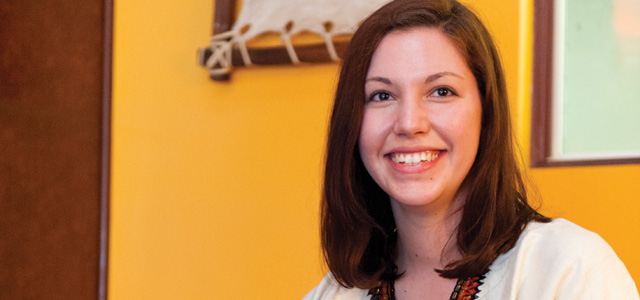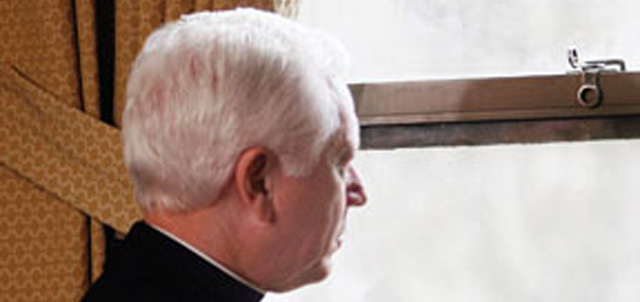One of Ethiopia’s holiest sites, the town of Lalibela, is renowned for its rock-hewn churches. Carved centuries ago from the town’s rocky hills, these monolithic houses of worship draw pilgrims from across the country and tourists from around the globe.
One spectacular sanctuary, the Church of St. George, rises from inside a 40-foot-deep stone canyon. Built in the shape of a cross, it is an excavation marvel believed to have been carved with hammers and chisels. A more solid foundation is hard to imagine.
Visiting Lalibela, Andrea Borrelli ’11 confirmed a deep spiritual foundation from which she hopes to build a life serving others. A December graduate from Fairfax, Va., Borrelli traveled to Ethiopia in June 2010 as part of a Whitehead School of Diplomacy and International Relations seminar on the African Union, a body of 54 nations focused on the continent’s development and integration.

“I really want to work for a nonprofit on human rights in Africa,” Borrelli says.
Led by Ambassador John Menzies, dean of the Whitehead School, the 10-day Ethiopian trip was one of several educational journeys abroad the school has sponsored. Organized like a diplomatic mission, the tour visited Addis Ababa, the Ethiopian capital and home of the African Union’s executive branch, as well as three sites of cultural interest — Lalibela and the cities of Gondar and Axum.
Borrelli was one of 17 Seton Hall undergraduates, graduate students and alumni who participated. The seminar included preparatory classes and visits with diplomatic officials in Ethiopia, with students required to submit a research paper following the trip.
But it was a visit to Lalibela Elementary School that prompted Borrelli and some fellow travelers to launch an initiative beyond the seminar’s formal scope.
The school’s campus of tattered, low-profile buildings provides education to nearly 2,300 students. Its small classrooms have cracked chalkboards, and with few desks nd chairs available, students attend in morning and afternoon shifts. There are no indoor toilets, and the library has only about 200 books.
Despite its bleak elements, Borrelli discerned a positive spirit. “The kids really did a great job decorating,” she says. “They had signs and posters all over the school, saying things like ‘Be yourself.’ ”
The travelers gave school supplies to some students they encountered in Lalibela. “These kids were so grateful for a pencil, because they don’t have those kinds of resources,” Borrelli says.
The experience left her wanting to do more. Upon returning to Seton Hall, she and eight others launched a nonprofit organization to support the school. They christened it Mageze, which in Ethiopia’s Amharic language means “to assist another.” Borrelli has served as Mageze’s campus liaison, and along with Kristina Schwab ’12 started a club — “Equip. Educate. Ethiopia”— to increase awareness, as well as raise funds for the fledgling nonprofit.
Schwab, who met Borrelli on the Ethiopia trip, credits her friend’s passion for the cause. “She wants to do everything possible to help the kids and Lalibela.”
The commitment to the project reflects Seton Hall’s mission of producing servant leaders in a global society, says Elizabeth Halpin, the Whitehead School’s assistant dean of external affairs, who was on the Ethiopian trip. “Serving this community on their own, taking the initiative to do this as students, is exactly what Seton Hall is trying to instill,” she says.
In January, Mageze’s leaders made the organization’s first donation — about $900 — to Lalibela Elementary School. Roxane Turner, M.A.’11, a Mageze co-founder, scheduled a trip to Lalibela to deliver the funds in person. The school plans to use the money to have a local carpenter construct bench desks for the classrooms.
As Borrelli seeks to parlay her undergraduate experience into a career with a larger nonprofit, she plans to stay involved with Mageze.
“I would love to go back to Lalibela one day and witness changes that we could hopefully help make,” she says.
Mike Cullity is a reporter for the New Hampshire Union Leader and a freelance writer.







